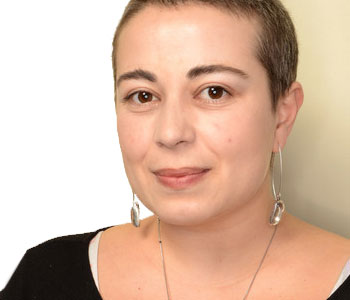Maya Vitkova • Director
“The audience can always feel if you are honest”
- Since her debut feature, Viktoria, was selected at Sundance and Rotterdam, Maya Vitkova has become the young star of Bulgarian cinema.

Born in Sofia in 1978, Maya Vitkova was involved with another famous local production, as an executive producer for Kamen Kalev's Eastern Plays [+see also:
film review
trailer
interview: Kamen Kalev
film profile], selected in the Directors' Fortnight competition at Cannes. After she founded her production company, Viktoria Films, she directed several popular shorts, selected at dozens of film festivals around the world. In Viktoria [+see also:
film review
trailer
interview: Maya Vitkova
film profile], she portrays three decades of Bulgarian history through the eyes of a dysfunctional family.
Cineuropa: Viktoria is a very ambitious film. When did you first think up the story, and how much time did you invest in bringing it to the screen?
Maya Vitkova: Honestly, I haven't thought about the story; I sat one night and wrote an 18-page treatment. It was back in 2005, in February. I had a first draft of the script by October the same year, and then I went on rewriting until I started pre-production in February 2012. Viktoria's script has been extremely important to me, as I didn't want to start shooting with a story that had unresolved issues. I did cut scenes before shooting, but I really reworked the script once again right before getting into production. It was essential for the story to be fresh, appealing and moving to me, so I could press on with it with my entire potential.
It's a film based on real events. What events happened in reality, and how did you change them when you used them for the screenplay?
The political events are real, and we even highlight the dates in the film. There are numerous key situations from the mother-daughter relationship that come from my own life experience. I don't want to emphasise them, as it's not a film about myself, but it is inspired by real events. When I did change them, I did this in a way that I felt would serve the story better. I didn't want to have problems with using or not using a particular event, hence the distance I've created between Viktoria's story and my own. It is hard to talk about your own life; it's much easier to pretend it is someone else's life, and that worked for Viktoria and for me.
Bulgarian cinema is usually dominated by male directors. Do you have a message for other woman directors working on their feature debuts?
It's not only Bulgarian cinema, I think. World cinema is dominated by male directors. I think the most important message to other woman filmmakers would be not to wait - you just need to make your film while it is still important to you, so you can pour your heart into it. The audience can always feel if you are honest, I am sure of that. So you need to fight for your story, express yourself and then present it to people. So, no waiting, do your best and it will work out – if not this time, then next time. If you want to make films, you first need to learn how to fall and get back up, again and again. Making films is like boxing: it's not always about winning, and more often than not your face is badly beaten up and your whole body hurts, but you still love that sport...
Viktoria is impressive in terms of art direction. Many period dramas with small budgets mainly use interior sequences, but you shot a lot out in the open. How did you manage that?
We wanted to make it for real - hence the locations we chose and the CGI. We shot in places that were very different from how they looked during the communist era. Then, after finishing with the editing, we gave the shots to the CGI artist and highlighted the changes that we needed. The CGI in the film is complicated and very detailed, actually: it took us four months to finish 80 shots, but we have no regrets. As a producer, I didn't save money by using expensive locations – I know that the production value is priceless, so I was trying to compensate in a different way. I paid for very expensive locations, as Viktoria's director wanted them. Can you really say "no" to yourself?
Did you enjoy reading this article? Please subscribe to our newsletter to receive more stories like this directly in your inbox.
















